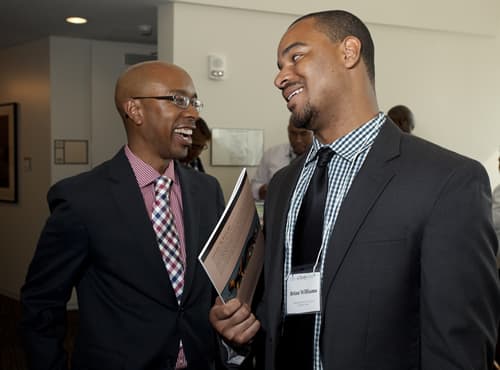
Chance Lewis, the Carolyn Grotnes Belk Distinguished Professor of Urban Education, presented new research on the challenges faced by school-age African-American males Wednesday, Sept. 5, at a forum hosted at UNC Charlotte Center City as part of the 49er Democracy Experience. Lewis conducted the research with Ivory Toldson, associate professor of counseling psychology at Howard University and editor-in-chief of the Journal of Negro Education.
Lewis and Toldson addressed an audience of citizens and community leaders from around the country at the event “Challenging the Status Quo: A Forum on Educational Equity and Inclusion for School-Age Black Males.” The forum was presented by the UNC Charlotte Urban Education Collaborative, in conjunction with the Howard University School of Education and the Congressional Black Caucus Foundation.
Mary Lynne Calhoun, dean of the UNC Charlotte College of Education, and Leslie Fenwick, dean of the Howard University School of Education, offered opening remarks. According to Fenwick, research on African-American men and boys has traditionally amounted to a “litany of pathology.” Calhoun and Fenwick applauded Lewis and Toldson for dismantling common misperceptions about the attitudes of black males toward schooling and for taking a solutions-oriented approach.
Lewis and Toldson visited schools, spoke to parents and community leaders, and culled existing literature and national data to develop policy and practice solutions that “ensure equitable resources, college and career readiness, and fair discipline practices for school-age black males…based on good research and good judgment and not on hyperbole and conjecture,” according to Elsie Scott, president and CEO of the Congressional Black Caucus Foundation.
A summary of their research findings were published in the report, “Challenge the Status Quo: Academic Success among School-age African-American Males.” At the forum, they offered evidence-based solutions for ways in which schools, families and communities can work together to improve the academic success of African-American male students.
The presentation was followed by a panel discussion moderated by Lewis. Panelists included Judge Rickye McKoy-Mitchell, District Court Judge, 26th Judicial District, Mecklenburg County; Heath Morrison, superintendent, Charlotte-Mecklenburg Schools; Juan Gilbert, chair and professor of human-centered computing, Clemson University; Stephen Hancock, UNC Charlotte associate professor of education and assistant director of the Urban Education Collaborative; Esrom Pitre, principal, Donaldsonville High School, Donaldsonville, La.; Cheryl Turner, principal, Sugar Creek Charter School, Charlotte; and Beth Marshall, executive director, Project L.I.F.T. Zone, CMS.
In his remarks, Morrison noted that destiny and demography have been one and the same for many young African-American males, and that Lewis’ and Toldson’s research shows that it doesn’t have to be that way.
Lewis and Toldson were featured in today’s third Inside UNC Charlotte report about the 49er Democracy Experience; the interview starts around the 2:15 mark.
Photo: Chance Lewis discusses his research findings with attendee Brian Williams at the Congressional Black Caucus Foundation panel discussion at UNC Charlotte Center City.